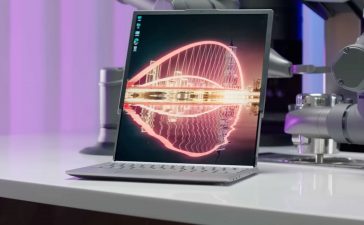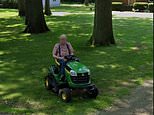At the second-to-last meeting of the Community Stakeholder Advisory Committee (CASC) for the Atlanta Public Safety Training Center on Wednesday night, members discussed security recommendations for public access to the green space adjacent to the site and the facility’s amenities intended for some community use.
Alan Williams, the Atlanta Police Foundation’s (APF) project manager for the site, which is widely known as “Cop City,” reported that the facility is still on track for a December opening.
“Progress over the last several months has been good,” he said, noting that sidewalks along Key Road have been installed, and most of the remaining work consists of interior finishes.
The group discussed some stormwater management concerns with Williams following Hurricane Helene, but the main focus of the meeting was recommendations for security at the site. CASC chair Alison Clark clarified that these suggestions from the committee ultimately may or may not be adopted by the Atlanta Police Department (APD), depending on their cost and risk assessments.
“Everybody has been explicitly clear that we will definitely do everything it requires to secure the facility and maintain its security posture at all times,” Marshall Freeman, chief administrative officer for APD, said. “We have obviously been in the space of securing the site 24/7, and we will continue to make sure that that is our posture as we move forward.”

Based on survey responses from 11 members of the CASC, the committee voted Wednesday to approve installing facial recognition equipment, establishing a security perimeter, installing emergency call boxes and limiting public access if security becomes an issue.
These suggestions would apply to the trails located off of Key Road that have been presented as a public green space.
Amy Taylor, who represents the Starlight Heights neighborhood, raised concerns about installing facial recognition tech and was the only committee member to vote against the recommendations.
“Why do we need facial recognition? I wouldn’t want to be trying to enjoy myself in a park knowing that my face is being recorded or I’m being watched basically,” Taylor asked.
She also raised concerns about the specifics of a security perimeter.
“Does that security perimeter include my neighborhood? Because it does now, and we hate it,” Taylor said. “What does it mean? Because we have seen in Starlight that it means more than we bargained for, and it has become very invasive.”
Atlanta is already one of the most heavily surveilled cities in the U.S., in part to programs funded by APF. No one on the call answered these questions, and Clark deferred to the judgment of APD and other law enforcement agencies on the specifics.
“I think that I understand your lack of comfort. I don’t share your lack of comfort, unfortunately, relative to the facial recognition or the security perimeter,” Clark said. “I don’t believe we are positioned to be able to say where that perimeter would end, but I do believe that your concerns have been noted.”
During the security discussion, members were limited to one question. The meetings, held on Zoom, do not include ways for other attendees from the community to comment or submit questions.

CASC members also discussed security measures like closing the parking lot on Key Road when it is not open to the public, prohibiting all tents and canopies, and putting stricter restrictions than typical Atlanta parks on the size of gatherings allowed at the green space, citing concerns about “domestic terrorist” activities.
The secure campus area, accessed from Constitution Road, includes a pavilion and community space that would hypothetically be open to public use. The committee members discussed implementing security checkpoints and weapons screening for this area and also proposed requiring permits to host any gatherings in these spaces.

Recommendations included limiting access to the secure campus to Atlanta or DeKalb residents, working only with community groups that can provide proof that they are registered organizations, and requiring an application and proof of residency as part of the approval process to get a permit for community events.
This committee is designed to sunset once the facility opens. The community members serving on the CASC have still not toured the new facility, though Clark said they hope to do so before the December ribbon cutting.
CASC will meet one more time this year, and Freeman proposed using the final meeting as a celebration of the work the members have done on behalf of the community.
“Thank you all for your input. I know it’s not the easiest information to go through, and none of us are experts on these topics,” Clark said. “I have made a suggestion that there continue to be community engagement going forward and I think that piece remains in place irrespective of whether this [committee] remains in place.”










